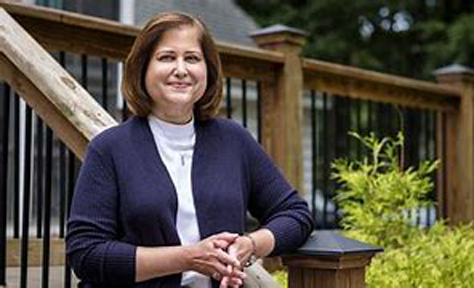RICHMOND, VA (TIP): Indian-born Virginia state Sen. Ghazala F. Hashmi is seeking the Democratic nomination for lieutenant governor in her party’s June 2025 primary.
A former literature professor and community college administrator, Hashmi (Chesterfield) became the first Muslim in the Virginia Senate and the first Muslim woman in either chamber after flipping a redrawn suburban Richmond district in 2019. “If we want to protect our freedoms, stand against hate and build a future that uplifts all of us, including our most vulnerable, we must always fight for what is right,” said Hashmi announcing her run.
“When I first ran, I realized that any one of us can make a positive, meaningful difference. We each have a responsibility to raise our voice and stand up against injustice, particularly those injustices that impact our neighbors and our communities.”
As a state senator, Hashmi has introduced and passed legislation to ensure affordable healthcare coverage, relieve medical debt, and help seniors afford housing. Her office says she’s also fought to strengthen workers’ rights to unionize, require insurance companies to cover contraceptives, crack down on hate crimes and improve mental health care for our veterans.
In an interview last week with The Washington Post, Hashmi, 59, said her ability to unseat a well-funded Republican in 2019 is part of what sets her apart from the crowded Democratic field. She also noted that, at least so far, she is the only woman in the race.
The other candidates are Prince William County School Board Chairman Babur B. Lateef, state Sen. Aaron R. Rouse (D-Virginia Beach) and Richmond Mayor Levar Stoney.
“As we’ve seen across the country, and certainly here in Virginia, the issues that are really propelling voters are focused on women’s issues,” she said, ticking off examples such as “reproductive justice,” childcare and paid family leave.
“Those issues are going to be absolutely top of mind for so many voters in Virginia, and as the only woman in the race, I speak to those issues very clearly and directly.”
Hashmi said she does not view the post as a launchpad to the governorship, but to expand her role in Richmond’s upper chamber, where Democrats have a 21-19 edge.
“It is really the LG position that’s attractive to me,” she said. “I really enjoy being a member of the chamber and being a part of the procedures and discussion and debate that we have.”
Yet Hashmi said she would like to reshape the position to function as a “bridge” between the Executive Mansion and the Capitol. “I’ve spent five sessions now in the General Assembly and I’ve seen how it’s really, really challenging to push critical and progressive legislation through, and it’s time to fight,” she was quoted as saying.
“We need someone who’s going to be able to not just serve as president of the Senate and break some ties, but someone who is actively engaged in the role of the lieutenant governor and is able to work as an effective bridge between the executive branch and the General Assembly, someone who has established collegial relationships with a variety of Senate colleagues, including people across the aisle.”
Hashmi was born in India and moved with her family at age four to the United States, where her father taught political science at Georgia Southern University. She eventually earned an undergraduate degree there in English.
While working on her PhD in American literature at Emory University in Atlanta in 1987, Hashmi got involved in civil rights marches in Forsyth County, northeast of Atlanta. At the time, the county hadn’t had any Black residents since White people violently drove them out in 1912.
She and her husband moved as newlyweds in 1991 to the Richmond area, where she spent 30 years as a professor, first at the University of Richmond and later Reynolds Community College. At Reynolds, she also served as the founding director of the Center for Excellence in Teaching and Learning.
She said her experience with the community college system has special relevance to the race given the role it plays in advancing economic mobility, particularly for working women with children, who represent the largest population of community college students.
Indian -origin professor Ghazala Hashmi joins race for Virginia lieutenant governor

Virginia state Sen. Ghazala F. Hashmi is seeking the Democratic Virginia state Sen. Ghazala F. Hashmi is seeking the Democratic nomination for lieutenant governor in her party’s June 2025 primary. nomination for lieutenant governor in her party’s June 2025 primary.